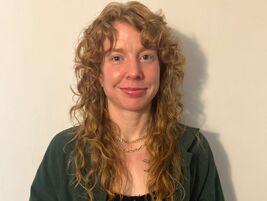Member of the Month: Allison Cardon (Ph.D., University at Buffalo, SUNY)

Allison Cardon is the newest Member of the Month! After reading her interview, you can find her latest publication--selections from her series "What Was the Sign You Gave" in Groundwork: The Best of the Third Decade of Above/Ground Press: 2013–2023 (published December 2023 by Invisible Publishing): https://invisiblepublishing.com/product/groundwork-the-best-of-the-third-decade-of-above-ground-press-2013-2023/
1. NMW: How did you become interested in eighteenth-century studies in particular?
AC: I came to eighteenth-century studies through two different professors: first, Ruth Mack, my advisor and professor at University at Buffalo. She is a really magnetic teacher who helped me to appreciate how utterly strange eighteenth-century literature is. I had begun my Ph.D. thinking I would study avant-garde poetry, but Ruth's classes showed me that these seemingly avant-garde questions about the materiality of language, the relationship between form, content, and context, all actually originate, at least in the British/Anglophone context, with the rise of aesthetics and print culture in the eighteenth century. The other route was through Alastair Hunt, a Romanticist with whom I took a couple of classes in my master's program at Portland State University. His course on seventeenth- and eighteenth-century political theory taught me to question the basic assumptions of humanitarianism, liberalism, and rights, questions that continue to guide my reading, research, and thought.
2. NMW: What are you working on right now?
AC: Right now I'm working on a more public-facing scholastic essay about teaching about rights at a moment like ours (inspired by my paper for your [ASECS 2023 “Fetishizing Rights”] panel, Nicole!) and researching a more traditional journal article about slavery and Samuel Foote.
3. NMW: What is one book or article that you are reading now that gets your creative and/or analytic side going? Why? (eighteenth-century studies, scholarship, anything)
AC: I'm reading W.E.B. DuBois's Black Reconstruction and find it endlessly inspiring on so many levels. First, his style is underrated--the man knows how to craft a sentence, a paragraph, and a chapter. DuBois has a penchant for surprise and his analysis is just riveting. Second, scholastically, his work inspires mine because he frames slavery as a question of labor and economy, which gives me a better handle on how to let go of the moralistic and theoretical modes of understanding that pervade literary conversations about slavery and abolition. What is the relationship between the general strike and rights? What a live, enlivening question!
4. NMW: How have recent events--e.g., the pandemic, political developments, technological advances, and/or shifts in higher education--changed your research agenda?
AC: The last...two years? seven years? have made me want to think more about identity politics, especially white identity politics, and most especially white women as a political status. Most white women voted for Trump, but women have also been the explicit target for a lot of labor discipline the end of pandemic-era protections, reproductive healthcare, wage suppression, and student loan capitalization), racist, sexist, and transphobic violence, and repressive, fascistic legislation (as well perpetrators of and emblems for anti-trans legislation, etc.). What a wild cultural and political hinge! What an identity! So I want to think more seriously about how eighteenth-century law and literature produce white women as an ideologically distinct, legally codified kind of person.
5. NMW: What more can be done to support women in academia? In ASECS? Anything you hope the Caucus in particular can address?
AC: Women in academia need secure jobs! I think we can all benefit from stronger unions, better pay, and more job protections.